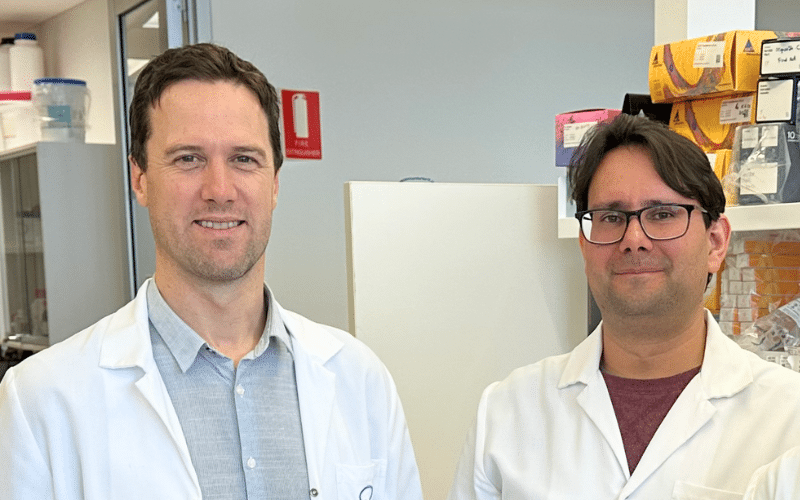
Two researchers at the Harry Perkins Institute of Medical Research have been awarded separate grants totalling $3.6million in federal government funding to better understand and treat diseases.
Perkins CEO, Prof Peter Leedman AO, congratulated Professor Ryan Lister (above, left) and Dr Daniel Poppe (above, right), stating their projects would provide researchers around the world with important insights into the ways disease genes behave and change.
“Ryan’s and Daniel’s work in these important areas exploring the foundations of disease research will help advance our understanding of disease, and the way diseases are treated in future. This funding will enable us to share outcomes locally and researchers around the world also stand to benefit from these WA discoveries,” Prof Leedman said.
Head of the Perkins Genome Biology and Genetics Laboratory, Professor Ryan Lister from The University of Western Australia (UWA), was awarded a Level 2 Leadership grant of $2,924,080 for his project ‘Exploiting epigenetic memory and manipulation to advance cell biotechnologies and disease treatment’. This will help researchers gain a better understanding of diseases which can inform future therapies.
“The epigenome, essential for cell function, is disrupted in disease and can store memories of a cell’s past,” Professor Lister said.
“This research will determine how cells remember their past and how to erase this memory to better engineer them, create new tools for adjusting gene activity to improve disease treatments and investigate epigenome disruption during development in neurological disorders.
Postdoctoral Fellow in the Perkins Epigentics and Genomics Lab, Dr Daniel Poppe, from UWA, was awarded an Emerging Leadership Level 1 grant of $674,400 for his project ‘Mature neuronal cell culture systems for the study of human disease’. This research will explore cell cultured neurons and help improve treatment for brain diseases.
“Diseases affecting the brain are often studied using cells cultured in a laboratory, but drugs discovered this way often fail because most cells generated outside the body remain in a young state, which may not be suitable for studying diseases that affect older adults,” Dr Poppe said.
“This project seeks to identify how cell cultured neurons are different to neurons found in a human brain and use this knowledge to improve their maturation and resemblance to real neurons.”
The research has been funded by the National Health and Medical Research Council’s Investigator Grants scheme, a major investment in Australia’s health and medical research workforce. The 2024 Investigator Grants round includes $35 million in funding to improve support for early and mid-career researchers.
